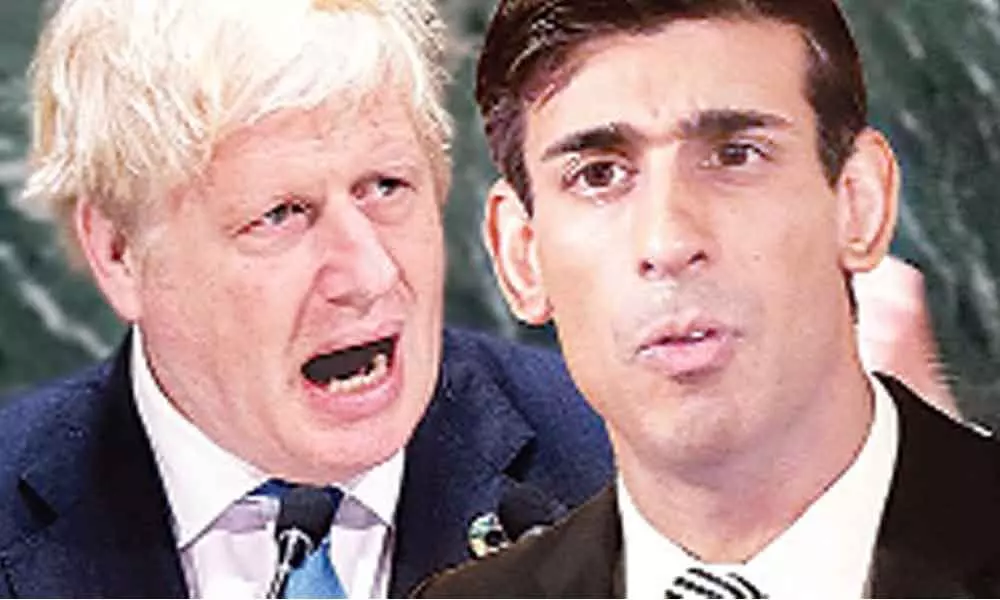Is Rishi Sunak playing risky game with Boris?
SOONER or later, all UK Chancellors of the Exchequer have a choice to make: Are they the Prime Minister’s executive assistant for financial affairs? Or their successor in waiting?
image for illustrative purpose

SOONER or later, all UK Chancellors of the Exchequer have a choice to make: Are they the Prime Minister's executive assistant for financial affairs? Or their successor in waiting?
It's a question that comes up because of the relative might of the UK Treasury and the ghosts of great Chancellors past, from William Gladstone to Winston Churchill to Gordon Brown.
Ambitious finance minister Rishi Sunak, who's already considered a potential successor to Boris Johnson, has so far managed a skillful course between pleasing his mercurial boss and holding true to his conservative fiscal principles. But this is rapidly changing.
Supply shortages, a burgeoning energy crisis and the threat of inflation are putting Sunak's relationship with Johnson under strain. Last week the prime minister put him in his place after the Treasury denied it was in talks about offering loans to businesses to help with their rising gas and electricity bills. The following day those talks with the Business Secretary Kwasi Kwarteng were on.
In the UK government, the business department is responsible for industrial policy, but in practice it takes its orders from the Treasury, which pulls the financial strings and is suspicious of bailing out companies, even for "special cases." Johnson made it abundantly clear he was on the side of intervening in the crisis. But it's not hard to see why Sunak would be reluctant.
In two weeks, Sunak delivers the U.K.'s annual budget to parliament. Ministerial colleagues have presented him with an expensive shopping list of demands, and the prime minister is demanding a diet of good news.
Buffeted on all sides, can the chancellor juggle prudent economics with political feel-good? He'll need the latter if he's to steer the Treasury, let alone vie for the top job one day. Johnson's first chancellor Sajid Javid, stung by his nickname acronym of CHINO for "Chancellor In Name Only," resigned within weeks over the humiliating constraints he felt were being placed on his independence by the prime minister's office.
It has been said that Johnson cannot afford to lose another chancellor so soon after the last one. That might have been true during the peak of Covid, when Sunak was at the height of his popularity for splurging billions on a jobs furlough and borrowing to secure the nation's finances.
Since then, however, the chancellor has raised taxes — a move that cost him his pole position as Conservative activists' favorite cabinet minister. (Foreign Secretary Liz Truss has replaced him as the darling of the party grassroots.) According to the Institute for Fiscal Studies, Sunak will have to more than double that levy to keep the government's promises to pay for elderly social care.
The chancellor's opinion poll ratings have tumbled too. The jobs furlough has ended and soon the Treasury will soon be clawing back a temporary lift to welfare benefits made during the pandemic. Unemployment is rising despite a record number of job vacancies.
Sunak now needs time. The autumn and winter of discontent will pass. A swift economic recovery from the pandemic downturn and light-touch intervention should smooth over the worst of his and the country's immediate problems. But until then, the chancellor will have to fasten his safety belt — it's going to be a bumpy six months.
The chancellor faces a prime minister who has kept his party ahead in the polls and who is no orthodox economic conservative – Johnson's natural instinct is to buy his way out of political trouble. Sunak, however, is a small-state Thatcherite forced to preside over a vast expansion of state spending (it exceeded 50 per cent of gross domestic product last year for the first time since the end of World War II).
He also wants to avoid more borrowing. If the Bank of England raises interest rates to choke off inflation — which is expected to rise to 4% by the end of the year - then the national debt will rise with it. A one-percent rise would entail an extra 25 billion pounds to service the debt — a sum larger than the budgets of middling Whitehall departments.
And the row with over energy subsidies has not been resolved. Kwasi Kwarteng is hardly an interventionist, but intensive energy users in the steel and chemical industries have been warning the business secretary that soaring costs will force them to cut production. They are pressing for a price cap similar to the one that protects households. The chancellor will want state support to come with strict, time-limited conditions, but because prices are unlikely to fall anytime soon, any subsidy to businesses would likely be prolonged.
The picture isn't all bleak. Business is at last getting the right signals and incentives to invest in new technologies that raise productivity. Some low wages will rise. Even the uplift in energy prices can be written off as a one-off cost. But the chancellor will hardly be the toast of ordinary working people when his tax rises kick in next year.
Sunak won't, then, be measuring the curtains in Number 10 anytime soon. He will first have to show he can weather a storm in hard times.

